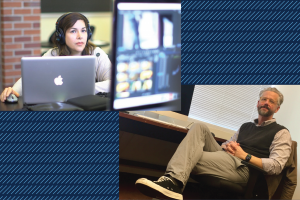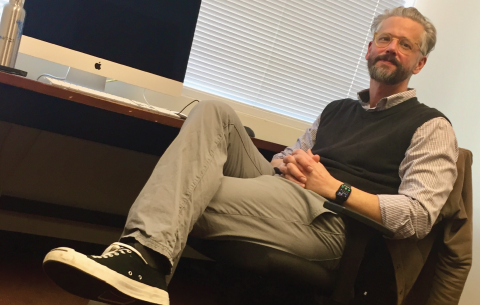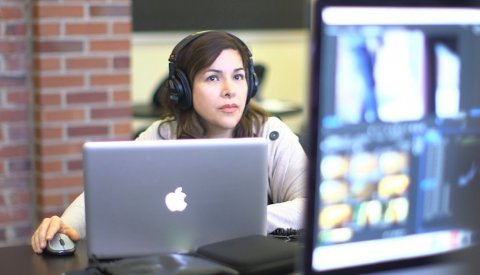UNC Hussman welcomes Scott Geier and Nazanin Knudsen as Teaching Assistant Professors

By Beth Hatcher
The UNC Hussman School of Journalism and Media welcomes Scott Geier ’16 (M.A.) and Nazanin Knudsen this semester as teaching assistant professors in digital storytelling and journalism.
Geier and Knudsen enhance the strategic growth in the school’s faculty this semester along with new hires Assistant Professor Shelvia Dancy, Hussman Professor of Business Journalism Michelle LaRoche, Knight Chair in Local News and Sustainability Marisa Porto and Professor of the Practice Peter Sherman.
Geier and Knudsen, both former adjunct instructors in the school, bring deep professional skillsets to the classroom, ranging from documentary film production to interactive web design.
“Naz and Scott are accomplished digital storytellers who strengthen the school’s expertise in digital media,” said Raul Reis, dean of UNC Hussman. “Their professional experiences deepen our connections with digital media leaders and community partners who help provide experiential learning opportunities for our students.”
Scott Geier

A former philosophy major, singer-songwriter and investigative reporter, Scott Geier has taken a circuitous route to web design — a field that was barely a career option during his youth in the 1990s.
Coding came of age along with Geier, a lifelong learner who taught himself web design so that he could build a website promoting his singer-songwriter work in Austin, Texas. He honed the craft with night school courses and then put it to work as an investigative reporter for a litigation support company based in Atlanta.
He then decided to pursue more formal education, earning a master’s degree in interactive media from UNC Hussman in 2016.
“Life is a river, not a lake — it’s going to take you where it takes you,” Geier said. “I tell my students, the best way to learn is to be curious and to try and fail and then try and fail again. The happiest people I’ve known in my life are lifelong learners.”
Geier’s areas of interest include front-end web development, data visualization, augmented reality, photogrammetry and generative art.
Geier began teaching at Hussman as an adjunct instructor in 2017 and considered teaching a dream job that filled him with purpose and energy. “I love feeling like I’ve been able to make a difference with students in this exciting field,” he said.
Geier is teaching “MEJO 121: Introduction to Digital Storytelling” and “MEJO 187: Foundations of Interactive Media” in spring 2023.
Nazanin Knudsen

For Nazanin Knudsen, digital storytelling has built bridges between her home country of Iran and the U.S., her adopted home since 2003, when she moved to Arizona for graduate school, where she earned a master’s in media arts from the University of Arizona. She has also received a M.F.A. in writing from Lindenwood University in Missouri.
“My life as an immigrant woman is wrapped in a cloud of nostalgia and often a sense of helplessness — the helplessness of not being able to do anything for my people back home,” Knudsen said. “My work is how I cope. I have learned to bridge the gaps of distance and loss in stories that reflect my background.”
Besides working various documentary film production jobs, Knudsen has taught at the Duke University Center for Documentary Studies, Elon University and The Art Institute of Raleigh-Durham. Knudsen first taught as an adjunct instructor at Hussman in 2019.
At Hussman, she is teaching “MEJO 121: Introduction to Digital Storytelling” and starting in fall 2023, she will teach “MEJO 333: Video Communication for PR and Marketing” in addition to “MEJO 121.”
Knudsen said digital storytelling’s ever-improving technology continues to make the artform more accessible and less exclusive, a trend that excites her as a professional and as an educator.
“Multimedia storytelling combines media forms and reaches broad audiences. It has so much potential to convey our message effectively and hopefully work toward changing some of the lingering critical issues of today's complex world,” Knudsen said. “In higher education, we discuss equity and inclusion more than ever. We don't have all the answers, but I love that we are experimenting with new and inclusive methods to teach, engage and collaborate.”